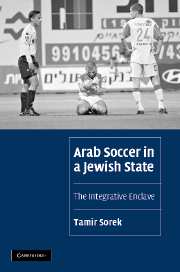Book contents
- Frontmatter
- Contents
- List of tables
- List of figures
- Preface and acknowledgments
- 1 Introduction
- 2 Sports, modernity, and struggle in Palestine
- 3 The emergence of the integrative enclave
- 4 Soccer and municipal “labor quiet”
- 5 “These points are Arab”: nationalist rhetoric in the sports press
- 6 “Maccabi Haifa is my flag”: Arab fans of Jewish teams
- 7 The Islamic Soccer League
- 8 Sakhnin – between soccer and martyrdom
- 9 Conclusion
- Appendix 1 Interviews with functionaries
- Appendix 2 Research design of the countrywide survey
- Appendix 3 Main findings from the countrywide survey
- Appendix 4 Research design of the survey in Sakhnin
- Appendix 5 Explanations for chapter 4
- Bibliography
- Index
- Cambridge Cultural Social Studies
4 - Soccer and municipal “labor quiet”
Published online by Cambridge University Press: 22 September 2009
- Frontmatter
- Contents
- List of tables
- List of figures
- Preface and acknowledgments
- 1 Introduction
- 2 Sports, modernity, and struggle in Palestine
- 3 The emergence of the integrative enclave
- 4 Soccer and municipal “labor quiet”
- 5 “These points are Arab”: nationalist rhetoric in the sports press
- 6 “Maccabi Haifa is my flag”: Arab fans of Jewish teams
- 7 The Islamic Soccer League
- 8 Sakhnin – between soccer and martyrdom
- 9 Conclusion
- Appendix 1 Interviews with functionaries
- Appendix 2 Research design of the countrywide survey
- Appendix 3 Main findings from the countrywide survey
- Appendix 4 Research design of the survey in Sakhnin
- Appendix 5 Explanations for chapter 4
- Bibliography
- Index
- Cambridge Cultural Social Studies
Summary
On a summery May evening in 1999, it seemed for a moment that the city of Nazareth had shunted aside the bitter conflict between Muslims and Christians that had embittered the life of its residents for two years. At the epicenter of the quarrel was a disputed area adjacent to the Church of the Annunciation, where the municipality wanted to prepare a square for the anticipated thousands making the pilgrimage in the year 2000, and upon which the Islamic Movement demanded to build a mosque because of its proximity to the grave of Muslim holy man Shihab al-Din. For a long time, this conflict nearly paralyzed the municipality's activities, leaving deep fissures in the city's social tissue. But on that evening, thousands of people flowed into the streets to welcome the heroes of the Maccabi al-Aakha al-Naṣira soccer team who were returning from Ramat Gan after winning a last-second victory that secured its place in the second division. A long caravan of buses had brought about 3,000 supporters to the game. The returning fans had alighted from the buses at the southern entrance to the city, and began to march – singing, dancing, and drumming. The mayor of Nazareth, Ramez Jeraisy, usually a well-dressed, necktied gentleman, had himself traveled to Ramat Gan and had delivered a pep talk to the players at half-time; now he was carried on the shoulders of the singing fans.
- Type
- Chapter
- Information
- Arab Soccer in a Jewish StateThe Integrative Enclave, pp. 57 - 80Publisher: Cambridge University PressPrint publication year: 2007



